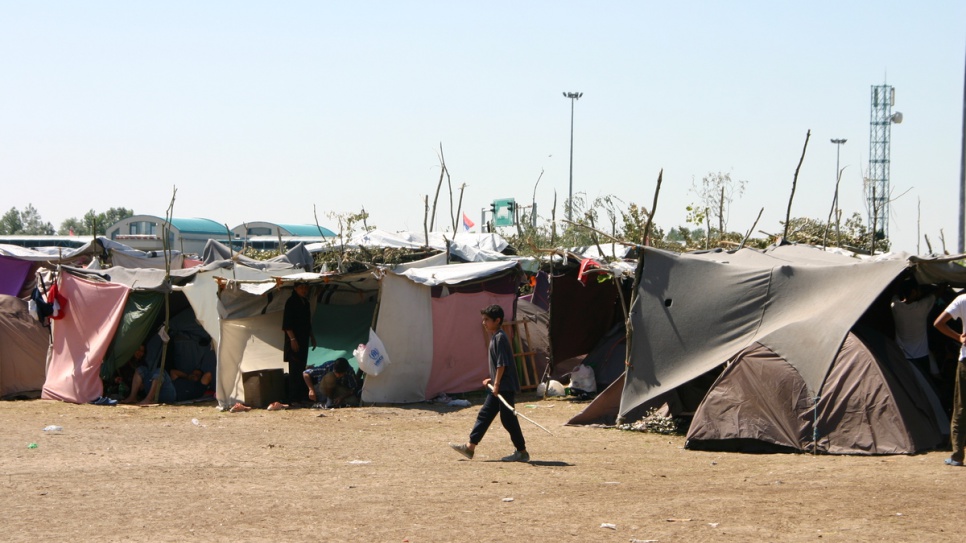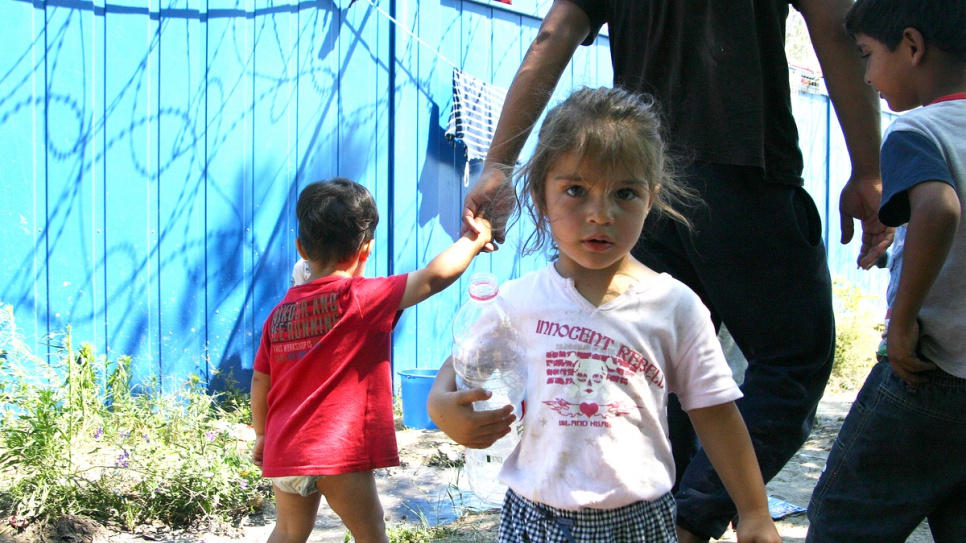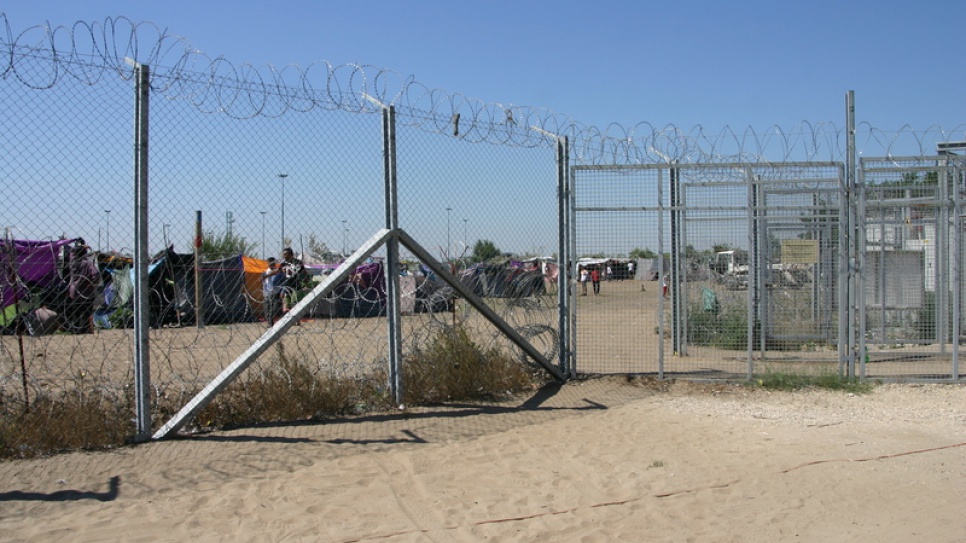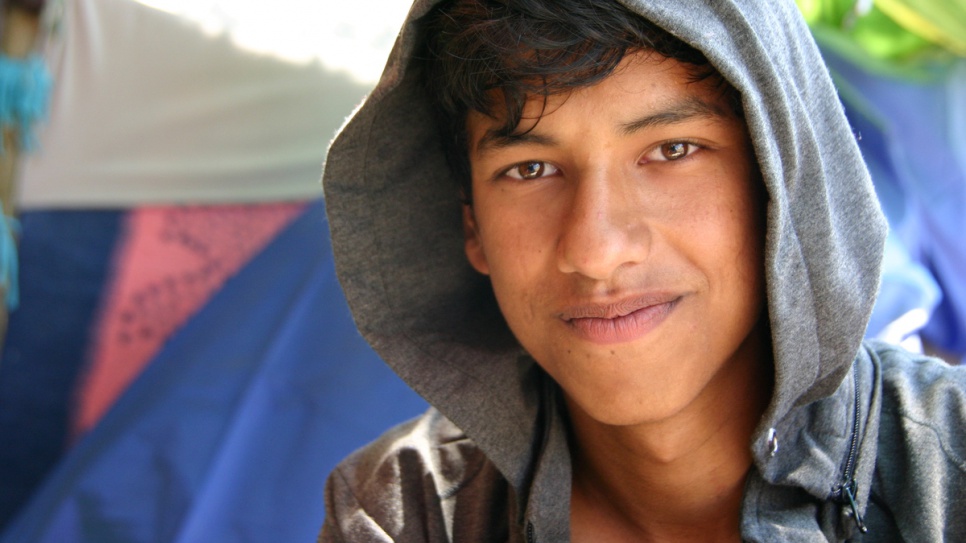Hundreds suffer at Hungary-Serbia border
Hundreds of people who fled persecution at home are now living in dire conditions at a makeshift camp near Röszke on the Hungary-Serbia border.

Sayed Parwez Ahmadi, 36, and his six-year-old daughter wait at the Hungarian transit zone where they have now been for over two weeks. © UNHCR/Zsolt Balla
RÖSZKE, Hungary – Sayed Parwez Ahmadi looks concerned as he puts another twig on the fire burning in front of their family tent in the makeshift camp near Röszke on the Hungary-Serbia border. His wife, brother and two cousins pull closer to the flames, as the afternoon gets chillier and another rainstorm is about to begin.
The only carefree members of the family are his four-year-old son and five-year-old daugther, playing cheerfully in the mud. Both are barefoot. Unlike Sayed, they have only vague memories of a life very different from this one. They have been on the road for six months and seventeen days.
"I don’t normally live like this and I don’t look like this,” says Sayed, pointing desperately to his environment and himself. The 36-year-old Afghan photographer is one of hundreds of people who fled persecution in their home countries and are now suffering as a result of inhumane conditions at the Röszke site. They are waiting to be admitted to one of the two transit zones of Hungary to seek asylum.
"Asylum-seekers are suffering and states must act to bring their suffering to an end,” says Montserrat Feixas Vihé, UNHCR's regional representative for Central Europe. UNHCR has long been advocating against border fences that fail to provide a solution for the crisis and direct the problems elsewhere, while aggravating the situation of asylum-seekers.
"Asylum-seekers are suffering and states must act to bring their suffering to an end."
This is particularly true for Hungary’s new regulations that extend border controls to an eight-kilometre area inside Hungarian territory. The law now allows the authorities to push back people who cross the border irregularly and are apprehended within this zone to the Serbian side of the fence. As an immediate impact of the new regime that was introduced on 5 July, the number of people waiting outside the Röszke transit zone has more than doubled. Waiting times are growing too.
Living conditions at the makeshift camp next Röszke are dire. Some 700 people share one cold water tap and ten mobile toilets which are cleaned every two or three days. People hang donated blankets from tree branches to protect themselves from the weather, but these are of little help when it rains.
Hungarian authorities will admit some 30 people each day, but hundreds of people are at the border already and more are approaching every day. UNHCR has repeatedly expressed its deep concern over the new Hungarian legislation and reports of authorities using force to implement it. “States have to work together to protect people and address their humanitarian needs,” Montserrat Feixas Vihé concludes.
As for Sayed, he feels slightly more confident now that his entire family is on the 'list' – a register of names that sets the order in which Hungarian authorities will admit them. Sayed’s family’s position on the list? They’re 216th.
However long, this list is an improvement compared to the chaos of previous months. But long waiting times work in favor of human smugglers, who exploit people’s desperation and who, as long as the situation persists, do not fear running out of business.
"Almost everybody tries it, at least once,” claims 22-year-old Mateolla Khan, referring to the irregular border crossing. Mateolla, a young man formerly employed by the Afghan government, tried to cross the border by cutting the fence no less than four times. He was caught and pushed back to Serbia each time, with the authorities using pepper spray to discourage him from further attempts.
"Pepper spray is not that bad, I’ve seen worse, and I’m used to it by now,” he says with a bitter laugh, adding that he sees no point in any further attempts. He and his brother are 31st and 32nd on the list of single men. Considering that families and vulnerable people are prioritized, they may have to wait for at least another 30-40 days.
Sixteen-year-old Musad claims that police pepper sprayed him, beat him up and unleashed police dogs on him when they found him after cutting the fence. He is in 86th position on the 'single men list' and has a long, long wait ahead of him.
"All I want is my kids to grow up in peace and safety."
People in the makeshift camp waiting to enter Hungary seem puzzled. "Why do I have to wait so long?" says Mustafa Hotaki, 22, who studied software engineering at Kabul University. "All my family is in Sweden, I only stayed in Afghanistan a little longer than them to finish my first semester.”
Unfortunately for him, during those months, more and more barriers materialized at the borders of Europe, and now joining his family has become a gargantuan undertaking.
"Any European Union country where we can be safe will do,” says 54-year-old Sayed Afsar Sadat, whose left hand was damaged in an airstrike when he was a child.
"I was a bank manager in Afghanistan, I had a house and a car. Now I’m nothing,” he says. He and his family have been at the border for 15 days and, if the list does not fail them, they have another 18 days to wait.
"We walked about 20 kilometres on Hungarian territory. The police did not hurt us, they simply took us back to Serbia. But what can you do? All I want is my kids to grow up in peace and safety."




